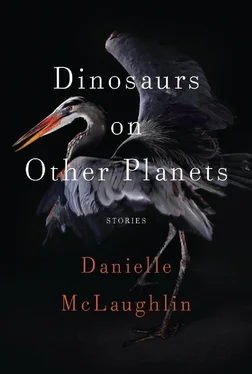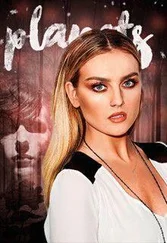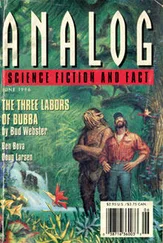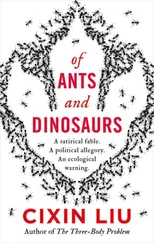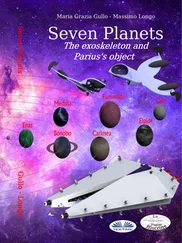They were all back: Colman, Emer, Oisín. Emer’s mood had changed. Now she was full of the frenetic energy that often seized her, opening the drawers of the cabinet in the sitting room and spreading the contents all over the carpet, searching for a catalog from an old college exhibition. Oisín had a new toy truck his grandfather had bought him. It was almost identical to the truck from beneath the stairs, except this one had all its wheels. He sat on the kitchen floor and drove it back and forth over the tiles, making revving noises. Colman was subdued. He made a pot of tea, not his usual kind, but the lemon and ginger that Kate liked, and they sat together at the table.
“How did you get on with Captain Kirk?” he said.
“Fine,” she said.
Emer came in from the sitting room, having found what she was looking for. She poured tea from the pot and stood looking out the window as she drank it. Pavel was at the end of the garden, taking photographs of the wind turbines. “Know what they remind me of?” Emer said. “Those bumblebees John used to catch in jars. He’d put one end of a stick through their bellies and the other end in the ground, and we’d watch their wings going like crazy.”
“Emer!” Kate said. “They were always dead when he did that.”
Emer turned from the window, gave a sharp little laugh. “I forgot,” she said. “Saint John, the Chosen One.” She emptied what was left of her tea down the sink. “Trust me,” she said. “The bees were alive. Or at least they were when he started.”
Oisín got up from the floor and went over to his mother, the new truck in his hand. “If I don’t take my laser gun, can I take this instead?” he said.
“Yes, yes,” Emer said. “Now go see if you can find my lighter in the sitting room, will you?” She made shooing gestures with her hand.
The child stopped where he was, considering the truck. “Or maybe I’ll take the gun, and I won’t take my Legos,” he said. “They probably have loads of Legos in Australia.”
“Australia?” Kate said. She looked across the table at Colman, but he was staring into his cup, swirling dregs of tea around the bottom.
Emer sighed. “Sorry, Mam,” she said. “I was going to tell you. It’s not for ages anyway, not until summer.”
—
IN BED THAT NIGHT, she began to cry. Colman switched on the lamp and rolled onto his side to face her. “You know what that girl’s like,” he said. “She’s never lasted at anything yet. Australia will be no different.”
“But how do you know?” she said, when she could manage to get the words out. “Maybe they’ll stay there forever.”
She buried her face in his shoulder. The smell of him, the feel of him, the way her body slotted around his, was as she remembered. She climbed onto him so that they lay length to length and, opening the buttons of his pajamas, she rested her head on the wiry hair of his chest. He patted her back awkwardly through her nightdress as she continued to cry. She kissed him, on his mouth, on his neck, and, undoing the remainder of the buttons, she stroked his stomach. He didn’t respond, but neither did he object, and she slid her hand lower, under the waistband of his pajama bottoms. He stopped patting her back. Taking her gently by the wrist, he removed her hand and placed it by her side. Then he eased himself out from under her, and turned away toward the wall.
Her nightdress had slid up around her tummy and she tugged it down over her knees. She edged back across the mattress and lay very still, staring at the ceiling. The house was quiet, with none of the sounds of the previous night. She could hear Colman fumbling at his clothing, and when she glanced sideways, saw he was doing up his buttons. He switched off the lamp, and, after a while, perhaps half an hour, she heard snoring. She knew she should try to sleep, too, but couldn’t. Tomorrow, they would return to London: Oisín, Emer, and Pavel. Oisín would probably want to take the skull with him. She pictured him waking early again, sneaking down to the bucket at first light. Swinging her legs over the side of the bed, she went downstairs in her bare feet.
A lamp on the telephone table, one of Colman’s wooden lamps with a red shade, threw a rose-colored light over the hall. The cat rushed her ankles, mewling and rubbing against her. “What are you doing up?” she said, stooping to run her hand along its back. “Why aren’t you in bed?” The door of the sitting room, where they kept the cat’s basket, was partly open. She listened and thought she heard something stirring. The cat had been winding itself in and out around her legs, and now it made a quick foray into the room, came running out again, voicing small noises of complaint. She went to the door and, in the light filtering in from the hall, saw a shape on the sofa. It was Pavel with a rug over him, using one of the cushions as a pillow.
He sat up and reached for his glasses from the coffee table. He appeared confused, as if he had just woken, but she noticed how his expression changed when he realized it was her. “Kate,” he said, and she was conscious, even in the semidarkness, of his eyes moving over the thin cotton of her nightdress. The house was completely still, and the cat had quieted, settling itself on the carpet by her feet. Pavel stared at her but said nothing more. They stayed like that, neither of them moving, and she understood that he was waiting, allowing her to decide. After a moment, she turned and walked down the hall to the kitchen, the cat padding after her.
In the utility room, she put on a pair of rubber gloves and, dipping her hand into the bucket, lifted out the skull. It dripped bleach onto the floor, and she got a towel and dried it off, wiping the rims of its eye sockets, the crevices of the jaws. She sat it on top of the washing machine and looked at it, and it returned her gaze with empty, cavernous eyes. Not bothering with a coat, she slipped her feet into Colman’s Wellingtons and carried the bucket of bleach outside.
It was cold, hinting at late frost, and she shivered in her nightdress. In the field behind the house, the pile of newly chopped wood appeared almost white in the moonlight, and moonlight glinted on the galvanized roof of the Dennehys’ shed and silvered the tops of the trees in the forest. She tipped the bucket over, spilling the bleach onto the ground. For a second it lay upon the surface, before gradually seeping away until only a flotsam of dead insects speckled the stones. Putting down the bucket, she gazed up at the night sky. There were stars, millions of them, the familiar constellations she had known since childhood. From this distance, they appeared cold and still and beautiful, but she had read somewhere that they were always moving, held together only by their own gravity. They were white-hot clouds of dust and gas, and the light, if you got close, would blind you.
Thanks to: Kate Medina and Derrill Hagood and everyone at Random House for their faith in me and this collection; Declan Meade of The Stinging Fly Press, who first published this collection in Ireland, for his belief in and commitment to short stories, with thanks also to Thomas Morris and all the Stinging Fly team; Mark Richards, Lyndsey Ng, and all at John Murray, my UK publishers; Victoria Allen, for the wonderful cover design; the brilliant Lucy Luck at Aitken Alexander, whom I’m extremely fortunate to have as my agent; the Munster Literature Centre, especially Patrick Cotter and Jennifer Matthews; my writing group — Marie Gethins, Barbara Leahy, and Marie Murphy — who provided feedback with a stellar combination of brutal honesty and kindness; Lory Manrique-Hyland, for her workshops in 2010 and 2011; the Arts Council, for awarding me a bursary to work on this collection; Listowel Writers Week and Noelle Campbell-Sharpe, for my time spent writing at beautiful Cill Rialaig; Tessa Hadley and M. J. Hyland, at whose workshops parts of this book took shape; Cressida Leyshon and Deborah Treisman at The New Yorker; Anne Enright, Éilís Ní Dhuibhne, Ita Daly, Ethel Rohan, and Joe Melia, who provided encouragement in various ways; the journals, writing competitions, and websites who afforded my stories publication space and prizes; and all my writing friends, who have been so generous in their support.
Читать дальше
